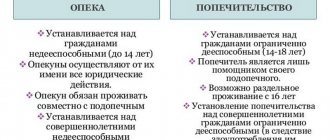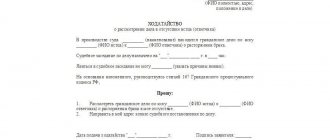Free legal consultation by phone:
8
Registration of a relationship between a man and a woman in the registry office presupposes the emergence of certain rights and obligations for both. All legal relations in the new unit of society are established and regulated by Russian legislative acts, in particular the Family Code. To know your rights and fulfill your duties in accordance with the law, you should study the current text of the Russian Investigative Committee (). This law clearly defines the rights of husband and wife, both personal and property.
What are the personal rights of spouses?
The non-property rights of spouses in marriage are also called personal. Family law defines them as - equality of husband and wife before each other. In more detail, according to the law, the personal rights of a married couple imply:
- husband and wife have the right to independently choose their occupation and workplace;
- a man and a woman in a formal marital relationship can (personally) independently determine their place of residence;
- both family members (husband, wife) have the right to personally decide on issues of raising children, as well as other nuances of family life;
- Both men and women have a choice of surname. The legislation provides for the following rights in relation to the choice of a surname in connection with marriage: choose a common surname that the husband and wife will have after the official registration of marriage;
- after marriage, each spouse remains with his or her last name;
- It is possible to get a double surname. The main thing is that before the wedding, neither the bride nor the groom has a double surname;
- upon official dissolution of a family union, both spouses have the personal right to choose a surname - keep the premarital name or the one acquired during marriage.
In addition to personal rights, the law also provides for the personal obligations of husband and wife. Commitments are necessary to ensure that the civil rights of people who get married are not violated.
Types of debts
Often, when married, each spouse has personal and general debt obligations. In the first situation, debts are repaid individually and not jointly.
If before marriage the wife or husband has specific obligations to pay off the debt, the second family member is exempt from such expenses.
Division of common property
Loan debt section
More often, when a married couple applies for a new bank loan, the following actions are performed: the husband is made the borrower, and the wife is made the guarantor, or vice versa. However, when jointly owning and using an apartment or other property, the division of the spouses’ credit obligations is carried out between both family members.
Payments of the remaining loan amount and interest are divided equally between the spouses. When applying for a loan individually, they also pay off the balance of such debt on their own (except for situations where other conditions are specified in a separate voluntary agreement).
Attention! When executing, amending or terminating a formal marriage contract, be sure to notify your specific creditor. This is done regardless of the current content of such a contract (clause 1 of Art. RF IC).
Article 46 of the Family Code of the Russian Federation “Guarantees of the rights of creditors when concluding, amending and terminating a marriage contract”
Section of other debt obligations
Loans and other similar debts incurred during the marriage are also divided between former family members.
In this situation, the division of certain debt obligations between spouses is carried out by voluntary agreement or through the court. A loan is understood as a debt for funds borrowed from a specific individual or company, but not from a bank. Important! The subject of the debt obligations of the spouses under the loan agreement is considered to be payment only of the main replacement amount (except for the case when the money is taken from a local pawnshop). If you have a loan, you also pay interest on it.
When borrowing money from close friends or family, all parties to the transaction enter into a formal agreement. It indicates who repays the debt, to what extent and in what time periods.
Read also: Rights of children without parental care
Mortgage section
Mortgages for spouses are issued in 1 of 2 options:
- Both husband and wife become mortgage co-borrowers.
- One of the family members is made the main borrower under the mortgage agreement, and the second is the guarantor under this document.
The mortgage debt is divided equally between the co-borrowing spouses. If the terms of the mortgage agreement are changed, an additional written agreement is concluded in a particular bank. Both spouses bear joint and several civil liability.
Attention! Divorced people by mutual consent re-register the mortgage agreement to one of the former family members. In such a situation, the second spouse is deprived of the obligation to pay the mortgage and any rights to such housing.
Another acceptable option is the sale of a mortgaged apartment or other housing with the consent of a specific bank and the division of the money received. In this situation, mortgage obligations are not divided because they are automatically canceled.
Maternity capital liability section
When maternity capital is invested in the purchase of an apartment or other housing, corresponding marital debt obligations arise. In this situation, the new living space is registered as joint common property (spouses and 1 or several common children).
Important! Upon official divorce, such housing is divided among all family members. According to Art. 10 Federal Law No. 256 of December 29, 2006, an apartment or private house is registered as common property six months after receiving maternity capital or after issuing a new cadastral passport.
Improving living conditions thanks to maternal capital
After an official divorce, both former family members pay the bank the remaining debt on a mortgage or other loan equally (or in other shares by mutual agreement). In this situation, only the mother and father of the child pay the mortgage equally. Minor children are exempt from such expenses.
Federal Law No. 256-FZ of December 29, 2006 “On additional measures of state support for families with children”
Alimony
According to Art. The Investigative Committee of the Russian Federation, when spouses are officially married, provide each other with both moral and material support. After a divorce, an agreement is often entered into to pay monthly alimony.
In the absence of a formal agreement, alimony payments are formalized in court. The following persons have the legal right to receive such money:
- Disabled spouse.
- Wife - during pregnancy and for 3 years from the date of birth of their common child.
- A spouse who cares for a common minor child with a disability or a son (daughter) who has been disabled since childhood and with group 1.
- Needy retired ex-husband. In this situation, alimony is issued after 5 years, at most, from the date of dissolution of a long-term official marriage.
Who can apply for alimony against whom?
Attention! Alimony is collected even if the wife has an income above the minimum wage, since during pregnancy, breastfeeding and caring for the baby, numerous expenses arise that are borne by both spouses. The above rights are reserved for the ex-wife even after an official divorce (Article RF IC).
Article 89 of the Family Code of the Russian Federation “Obligations of spouses for mutual maintenance”
Article 90 of the Family Code of the Russian Federation “The right of the former spouse to receive alimony after divorce”
Read also: Division of marital property
Personal responsibilities according to the RF IC
According to Family Law, the personal responsibilities of a husband and wife must be equal. All responsibilities of spouses, according to the law, are based on the following criteria:
- family relationships between a man and a woman are based on mutual respect and mutual assistance;
- both spouses are obliged to contribute to their unit of society and also take care of its well-being;
- spouses, having become parents, must equally care for their children and also support their health and development.
The personal responsibilities of a husband and wife include taking into account each other’s interests when resolving family conflict situations. The main personal responsibility of the husband (wife) is to perform actions that will not affect the interests of the second spouse and children.
Much in the family depends on the joint efforts of both spouses
[reklama2]
Spouses are obliged to build their relationship on the basis of mutual respect and mutual assistance, to promote the well-being and strengthening of the family, to take care of the well-being and development of their children (clause 3 of article 31 of the Family Code). Misbehavior of one of the spouses in the family can lead to a number of negative legal consequences for him. For example, the court has the right to release a spouse from the obligation to support another spouse - disabled and in need, if he behaved unworthily in the family: he was constantly drunk, spent property to the detriment of his family, treated his wife cruelly, etc.
One of the basic personal rights of spouses is the right to choose a surname upon marriage. In accordance with Russian legislation, the choice of a surname depends solely on the will of those entering into marriage. Each of them - this applies equally to both husband and wife - independently determines whether upon marriage he will retain his premarital surname or take the surname of the other spouse as a common surname. In most cases, spouses adopt a common surname. A common surname emphasizes the common interests of all family members and facilitates the implementation of the rights and responsibilities of spouses, parents and children.
As a common surname, spouses also have the right to choose a double surname, combining the surnames of the spouses, if the law of the subject of the Russian Federation in whose territory the marriage takes place does not prohibit combining surnames. Currently, such a ban has not been established in any subject of the Russian Federation. This general rule has one exception: if the surname of one of the spouses is already double, further joining of surnames is not allowed (Article 32 of the Family Code).
[advertisement3]
A change by one of the spouses during the marriage of his surname does not automatically entail a change in the surname of the other spouse and their common minor children. Spouses freely and independently decide on the issue of a surname in the event of divorce. Each spouse can, after a divorce, keep the surname he adopted at the time of marriage, or ask that his premarital surname be restored to him. The consent of the other spouse for the divorced spouse to retain his surname is not required.
The issue of changing the surname of a child under 14 years of age after the divorce of his parents, if the child and the parent with whom the child remains to live have different surnames, is decided by the guardianship and trusteeship authority based on the interests of the child and taking into account the opinion of the other parent whose surname he bears. child (Article 59 SK).
A child who has reached the age of 14 years and has received a passport has the right to apply to the civil registry office with a request to change his surname. In this case, the consent of his parents is required, and in the absence of such consent, a court decision. [adklama4]
What are the property rights of spouses?
The property rights of husband and wife are strictly regulated by law. Property legal relations mean the rules of ownership and use of joint and personal property. These legal relations arise between spouses from the moment the family is created, that is, after the official registration of the marriage. The property rights of a married couple are determined as follows:
- According to the law, personal property includes only things that belong individually to each spouse. For example, shoes, personal hygiene products and property acquired through marriage registration;
- It is important to consider that jewelry and luxury items are not recognized by Russian law as personal property;
- Personal property that both spouses have the right to use means property received by one of them as a result of a gift or inheritance;
- all property of the husband and wife acquired during the marriage relationship is considered to be jointly acquired property, and, accordingly, both the man and woman in a married couple have the right to use them in equal conditions;
- Neither spouse has property rights to the property of other family members, even to the property of minor children.
The property rights of a married couple are subject to joint use, and personal rights are subject to conditional agreement. In accordance with Russian legislation, it is allowed to draw up a marriage contract. Based on this contract, the husband and wife will be able to use the property taking into account the wishes of each party. It is important to draw up this agreement taking into account all the provisions of the law, otherwise it may be declared invalid and, accordingly, will not have legal significance.
Familiarize yourself with the rules for drawing up a marriage contract
Personal non-property rights include
- the right of the spouse to choose his occupation;
- obtain a profession of your choice;
- choose your place of residence and place of stay, that is, decide for yourself the question of where to live and whether to live together with the other spouse or separately from him;
- the right of spouses to equality when resolving issues: raising and educating children; paternity and maternity; family planning; distribution of the family budget; housekeeping; other issues of family life;
- other rights provided for by family law.
These personal non-property rights cannot be the subject of a marriage contract or other transactions.
[advertising]
Closely related to personal non-property rights are the following responsibilities of spouses:
- the obligation not to interfere with the other spouse’s exercise of personal non-property rights;
- provide each other with mutual moral support;
- promote the material well-being of the family;
- promote the comprehensive spiritual, moral and physical development of all family members.
From the moment the marriage is registered in the registry office, the persons who entered into the marriage become spouses. From this time on, personal and property rights and obligations arise between them. The personal rights and obligations of spouses are a direct consequence of marriage and determine the basis of the relationship between spouses in the family.
Personal relations of spouses are regulated by both legal norms and moral rules of behavior, since the law provides for the construction of family relationships on feelings of mutual love and respect, mutual assistance and responsibility (Article 1 of the Family Code). In Art. 31, 32 of the Family Code contain only general fundamental provisions concerning the personal rights and obligations of spouses, which are important for ensuring the equality of spouses in the family, protecting the personal interests of each of them, and the proper upbringing of children.
The personal non-property rights of spouses are closely related to the personality of each of them and are elements of the legal status of a citizen (Articles 19, 27 and 37 of the Constitution). They cannot be canceled or changed in connection with a citizen’s marriage. The disagreement of one of the spouses with the choice of the other spouse has no legal consequences.
The legislation is based on the complete equality of spouses in the family and establishes that issues of motherhood, paternity, upbringing, education of children and other issues of family life are resolved by the spouses jointly, that is, by mutual consent. The equality of spouses in the family is not only enshrined as a general principle, but is also guaranteed in all areas of family relations.
Property responsibilities
Property obligations between husband and wife are determined by the presence of permanent sources of income on both sides from which the family budget will be formed. But the law stipulates that if one of the spouses does not work officially, but is engaged in housekeeping, then this type of activity is also recognized as a contribution to their unit of society.
For example, a woman does not work, but takes care of raising children and the house, while her husband earns money to support the entire family. According to the law, all property acquired during this period at the expense of one of the spouses will still be considered jointly acquired. Therefore, the husband and wife have the right to dispose of it in equal shares both during marriage and after its dissolution.
In Russia, the law does not recognize evasion of property obligations. For example, a man does not work and does not support his family, does not provide financial resources for the upbringing and maintenance of children, although he is fully able to work, then he can be held accountable for mandatory payment of alimony. You can be forced to provide financial support even during a marriage relationship. Maintenance obligations may arise in the following situations:
- one of the spouses is incapacitated and, accordingly, he needs proper care and assistance from outsiders;
- pregnant woman;
- the wife is on maternity leave for up to three years;
- the wife is caring for a disabled child and, accordingly, she is not able to go to work.
When children are born, other property obligations arise in the family. It is understood that the born baby has rights to the living space where he is registered. Parents may also have property rights to their children’s property, which they received, for example, by inheritance, if the child is not yet 18 years old. According to the law, only upon reaching the age of majority do citizens have the right to independently dispose of property. Until this moment, all obligations for maintaining the children’s property lie with the parents.
General characteristics of the rights and obligations of spouses
The main feature is the reciprocity of rights and obligations. Since spouses have equal rights, then, as a general rule, the distribution of rights and responsibilities occurs in equal shares.
Equality of relations can be manifested, for example, in the choice of profession, place of residence and stay, and the purchase of property.
However, some rights and obligations can only be exercised by one of the parties to the marriage relationship. For example, the birth of a child and its feeding are carried out by the mother.
Responsibility for obligations
In accordance with Art. 45 of the RF IC, liability for property and obligations registered for personal use lies only with its owner. Penalty measures can only be applied to the spouse who is the owner of the obligations. If the debtor does not have the ability to repay the debt, then the creditor has the right to recover in whole or in part the debtor’s share of the joint property that was acquired by the latter with the spouse and would have gone to the defaulter during the divorce during the division of property. In the absence of a marriage contract, the size of the debtor's share and its alienation in favor of the creditor is regulated by Art. 38-39 RF IC. If an agreement has been drawn up between the spouses, the withdrawal procedure is determined by its clauses.
If during the court hearing it is established that the defaulter took out a loan to meet the needs of the entire family, then the penalty will be imposed on the common family property. This rule is determined by paragraph 2 of Art. 45 RF IC.
If the jointly acquired property is not enough to pay off the common debt of the spouses, then the creditor has the right to demand the alienation in his favor of the property that is the personal property of each of the couple. The amount of recovery is determined by the amount of debt. All or part of the debtors' property may be subject to confiscation. That is, the legislation provides for joint liability of the married couple in terms of repayment of debts that are recognized as common.
Damage caused to minors
General obligations also include the claim of the injured party for compensation for damage caused by a minor child of the couple. In this case, we mean damage of a property, financial nature, as well as damage to the life and health of the victim. Legislative regulation of compensation for damage caused is carried out by articles of the Civil Code, namely Art. 1073-1075. The penalties applied will depend on the age of the child and the degree of his legal capacity. The procedure for collecting jointly acquired or personal property from spouses is identical to a similar procedure in the event of non-payment of debt to a creditor.
For children aged 14 to 18 years, legislators have provided for the possibility of independently concluding transactions (or with parental permission). Minors will fulfill their obligations under concluded contracts and damage caused on their own. But if they do not have funds or other property to fulfill their obligations, then the parents must pay compensation.
Parents' obligations to compensate for damage caused by a minor child terminate after he or she reaches the age of 18 or before it occurs if the offender has a permanent source of income or other property that can be used to pay off the debt. In the future, after full compensation for the damage, the parents have the right to receive compensation from the child.
Collection of personal and common debts of spouses is possible only after a court decision. The methods for carrying out the seizure procedure are determined by Chapter 4 of the Federal Law of the Russian Federation dated July 21, 1997 “On Enforcement Proceedings and the Code of Civil Procedure”. Obligations for the collection of property are assigned to bailiffs. The process must be carried out on the basis of a writ of execution and consists of an inventory, seizure, seizure and sale of the debtor’s property.
General obligations of husband and wife
This type of responsibility is represented by obligations arising by mutual agreement of the spouses to meet the needs of the entire family. General obligations include:
- execution of a loan agreement;
- mortgage loan;
- borrowing money to purchase various real estate properties;
- registration of arena contracts, purchase and sale agreements, and so on.
For general obligations, the law provides for the joint responsibility of husband and wife. Even in cases where the documented debt belongs to only one of the couple (for example, a loan agreement is signed by the wife), both spouses bear the obligation to repay it, since the loan was issued to meet the needs of the entire family.
Also in cases of joint infliction of damage to third parties on the basis of Art. 1080 of the Civil Code of the Russian Federation, general liability arises for a married couple. Article 45 of the RF IC, paragraph 3, provides for joint obligations resulting from any harm caused by the minor children of the spouses.
In this regard, during the divorce process, it will be necessary to clarify all the circumstances surrounding the occurrence of liability (date, purpose, direction of use, etc.). Only after all the details have been clarified will it be possible to determine whether the spouses will jointly fulfill the obligations assigned to them or whether the responsibility will be transferred to one of them.








